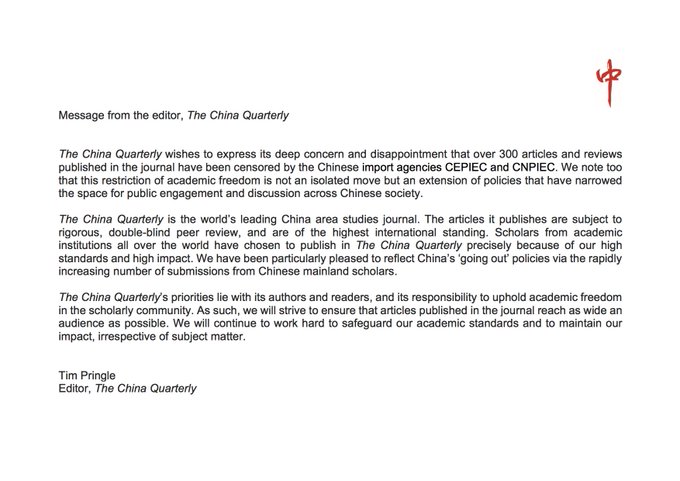By Richard Adams

The British Tradition
Cambridge University Press has blocked readers in China from accessing hundreds of academic articles – including some published decades ago – after a request by Chinese authorities, arguing that it did so to avoid its other publications from being barred.
The publisher confirmed that hundreds of articles in China Quarterly, a respected scholarly journal, would be inaccessible within China, after a letter from the journal’s editor protesting against the move was published.
“We can confirm that we received an instruction from a Chinese import agency to block individual articles from China Quarterly from within China,” CUP said.
The publisher confirmed that hundreds of articles in China Quarterly, a respected scholarly journal, would be inaccessible within China, after a letter from the journal’s editor protesting against the move was published.
“We can confirm that we received an instruction from a Chinese import agency to block individual articles from China Quarterly from within China,” CUP said.
“We complied with this initial request to remove individual articles, to ensure that other academic and educational material we publish remains available to researchers and educators in this market.”
The decision was greeted with dismay by academics and contributors to the journal.
“We are shocked by Cambridge University Press’s decision to comply with requests for censorship,” a group of authors, including Anna Ahlers, a professor in modern Chinese politics and society at the University of Oslo, wrote in an open letter.
The decision was greeted with dismay by academics and contributors to the journal.
“We are shocked by Cambridge University Press’s decision to comply with requests for censorship,” a group of authors, including Anna Ahlers, a professor in modern Chinese politics and society at the University of Oslo, wrote in an open letter.
“Hopefully CUP will reverse its policy and insist on academic freedom even if Chinese authorities do not.”
The decision marks a more aggressive turn by Chinese authorities, which in the past have blocked access to international news, often through its “great firewall” that restricts internet traffic.
The decision marks a more aggressive turn by Chinese authorities, which in the past have blocked access to international news, often through its “great firewall” that restricts internet traffic.
But the move against a relatively small-circulation academic journal is unusual.
A list of the more than 300 articles banned by the Chinese government agency show that many involve the disputed nation of Tibet, with titles including “The position of Tibet in international law” published in 1968 and another “The situation in Tibet” published in 1961.
Others on the blocked list discuss events around the 1989 Tiananmen Square Massacre, the legacy of Mao Zedong and China’s cultural revolution in the 1960s, including an article entitled: “The collar revolution: everyday clothing in Guangdong as resistance in the cultural revolution”.
Tim Pringle, editor of the journal, posted a letter expressing his “deep concern and disappointment” at China’s decision.
“The China Quarterly is the world’s leading China area studies journal. The articles it publishes are subject to rigorous, double-blind peer review, and are of the highest international standing,” Pringle said.
A list of the more than 300 articles banned by the Chinese government agency show that many involve the disputed nation of Tibet, with titles including “The position of Tibet in international law” published in 1968 and another “The situation in Tibet” published in 1961.
Others on the blocked list discuss events around the 1989 Tiananmen Square Massacre, the legacy of Mao Zedong and China’s cultural revolution in the 1960s, including an article entitled: “The collar revolution: everyday clothing in Guangdong as resistance in the cultural revolution”.
Tim Pringle, editor of the journal, posted a letter expressing his “deep concern and disappointment” at China’s decision.

“The China Quarterly is the world’s leading China area studies journal. The articles it publishes are subject to rigorous, double-blind peer review, and are of the highest international standing,” Pringle said.
“Scholars from academic institutions all over the world have chosen to publish in the China Quarterly precisely because of our high standards and high impact.”
CUP said it would raise the issue with the agencies at the Beijing book fair next week.
CUP said it would raise the issue with the agencies at the Beijing book fair next week.
“The issue of China and censorship is not a short-term issue and therefore requires a longer-term approach. There are many things we can’t control but we will take every opportunity to influence the agenda,” CUP said.
Pringle, a lecturer at the School of Oriental and African Studies in London, told the New York Times that the bans would particularly hurt academics within China itself.
Pringle, a lecturer at the School of Oriental and African Studies in London, told the New York Times that the bans would particularly hurt academics within China itself.
“It’s a real pity that as China goes out to the world, it is accompanied by restrictions on academic freedom,” he said.
Zhan Jiang, a professor at Beijing Foreign Studies University, told the NYT: “This is unprecedented that the censorship has reached out to the academic sphere. There are many Chinese scholars who return to China after studying overseas and they need to do research based on material in English. This means that there will be limits and more hardships on their research.”
Zhan Jiang, a professor at Beijing Foreign Studies University, told the NYT: “This is unprecedented that the censorship has reached out to the academic sphere. There are many Chinese scholars who return to China after studying overseas and they need to do research based on material in English. This means that there will be limits and more hardships on their research.”
Aucun commentaire:
Enregistrer un commentaire